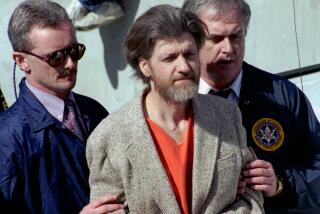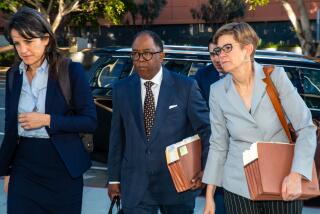Defense Strategy Emerges in Unabomb Case
- Share via
SACRAMENTO — Attacking the mountain of material assembled by prosecutors, attorneys for Unabomber suspect Theodore J. Kaczynski have for the first time offered a glimpse of their defense strategy--an effort that centers on the argument that the government’s evidence could point to many people, not just their client.
The government’s evidence attempts “to seduce the reader by its detail, but it really [is] like a spinning compass, not pointing in any true direction,” defense attorneys argued in papers filed in federal court this week.
The defense challenge so far has focused on a 104-page affidavit used to obtain a search warrant at Kaczynski’s Montana cabin, but is in reality a detailed critique of the government’s evidence, arguing that the case is not airtight and riddled with “misstatements, omissions [and] speculation.”
The defense documents provide clues that begin to answer a key question about Kaczynski’s trial, which is scheduled to begin in November: Just how is the defense team, headed by attorneys Quin Denvir and Judy Clarke, expecting to challenge the huge mass of circumstantial but highly incriminating evidence that prosecutors have put together.
To back up their argument that federal officials were too quick to single out Kaczynski, defense attorneys have turned to Kaczynski’s family, whose suspicions led authorities to the former mathematics professor, but who now say in sworn statements that the government twisted some of their comments. The defense team has also tapped the memories of bus drivers who transported Kaczynski over Big Sky country back roads and neighbors who gave him lifts.
They have also alleged that the government withheld DNA analyses that would have tended to exclude Kaczynski as a suspect. At least some of the DNA samples taken from some of the Unabomb packages could not have been from Kaczynski, the defense asserts.
In seeking permission to search Kaczynski’s cabin, FBI agents had highlighted the DNA type on a letter to David Kaczynski, the suspect’s brother, that matched the DNA type on a Unabomber letter. The defense asserts that the DNA analysis showed only “that Mr. Kaczynski might be one of almost 7 million Americans whose DNA type was found on the letters.”
Kaczynski’s lawyers also are attacking federal authorities for ignoring what the defense asserts are important differences between Kaczynski’s writings and those known to have been written by the Unabomber.
“The themes of the various documents and the words highlighted in the documents were so commonplace that one could not posit common authorship,” the defense states.
In their challenge, Denvir and Clarke are asking U.S. District Judge Garland E. Burrell Jr. to suppress the evidence found at their client’s tiny cabin near the town of Lincoln, Mont., on the grounds that at the time the search began, federal agents did not have probable cause to believe that Kaczynski was involved in the bombings.
A ruling that the evidence found in the cabin could not be used in the trial would obviously be a major blow to the government’s case.
But legal experts note that motions to quash evidence are routine and face many hurdles and usually are not granted. That is especially true in high-profile cases “in which there is a great deal of incriminating evidence,” said Joshua Dressler, a professor of law at McGeorge Law School in Sacramento who has been following the Unabomber proceedings.
Prosecutors have until April 14 to respond to the motion. On Tuesday, Assistant U.S. Atty. Robert Cleary, the lead prosecutor, declined to comment.
Kaczynski, 54, was indicted in June on charges that he engineered four attacks that killed two Sacramento men and injured a UC San Francisco geneticist and a Yale University computer scientist. Kaczynski, now in Sacramento County Jail awaiting trial, has pleaded not guilty to the charges.
David Kaczynski first suggested to the government that a 35,000-word Unabomber manifesto published by the Washington Post and the New York Times paralleled his brother’s writings on the inhumanity of industrial society.
But in a sworn statement attached to the defense brief, David Kaczynski said the FBI failed to accurately reflect his views. For instance, in the FBI affidavit, David is quoted as saying that he had developed a suspicion that his brother was involved in the series of bombings that began in 1978. But David Kaczynski said to the defense: “I told the agents that at that time I had a passing thought that Ted could be involved. This paragraph does not fit the tone or spirit of what I told the FBI.”
Likewise, the affidavit quoted Theodore Kaczynski’s mother, Wanda Kaczynski, as saying that the description of the Unabomber fit her son. In her sworn declaration, Wanda Kaczynski denied making such an observation, “only that he lived alone and was against technology.”
Moreover, Wanda Kaczynski said she told agents that she “did not think Ted was the Unabomber because he hated to travel, he did not like being around people or noise, he did not have a lot of money, and he had never been violent.”
The FBI affidavit cited a number of bus trips Kaczynski took from Lincoln. But defense lawyers faulted the government for providing “no information concerning Mr. Kaczynski’s bus travel that tended to connect him in any way with any Unabomb incident.”
The defense claims that the affidavit intentionally left out statements from bus drivers who said they saw Kaczynski only on routes within Montana, not out of state.
The FBI also omitted information from neighbors that Kaczynski’s trips to Missoula, Mont. were only short trips for errands, usually with returns the next day, according to defense attorneys.
The judge in Montana should have been alerted that there were a number of suspects under investigation when FBI agents descended on Kaczynski’s property, defense lawyers argue. “Rather than present an accurate picture, the government chose to mislead the court into believing that there were no serious suspects other than Theodore Kaczynski.”
More to Read
Sign up for Essential California
The most important California stories and recommendations in your inbox every morning.
You may occasionally receive promotional content from the Los Angeles Times.













